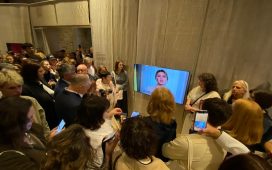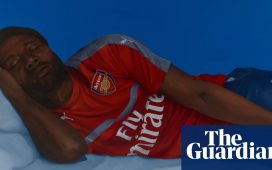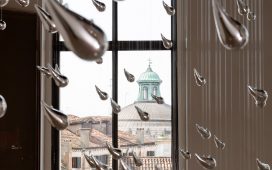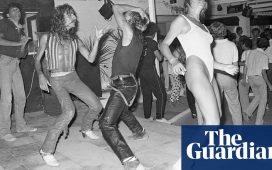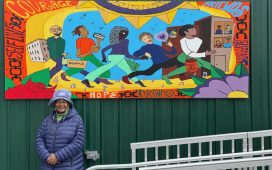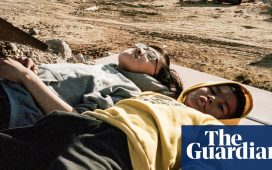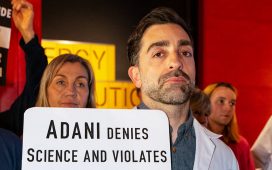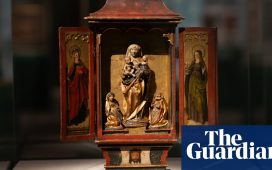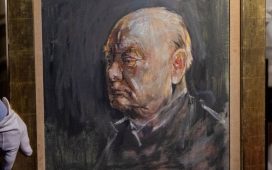‘Art will make people better, more highly skilled in thinking and improving whatever business or occupation one goes into. It makes a person broader.” So proclaimed Ruth Asawa in 1976. Born 50 years earlier, she was a US artist hailed for her cocoon-like sculptures made from interlocking, silvery wires that hang from the ceiling and evoke womb-like forms. When lit, they create shadows, enhancing unexpected shapes from every angle.
Asawa is also remembered as one of the foremost educators in the San Francisco region, having founded the city’s first public arts high school in 1982 – renamed Ruth Asawa San Francisco School of the Arts in 2010. Raised on a farm in California by immigrant Japanese parents, as a teenager, Asawa became one of the 100,000 Japanese Americans placed in internment camps after the attack on Pearl Harbor in 1941. In the camp, one of her tutors included Tom Okamoto, an animator for Walt Disney, who no doubt served as an influence for her later fine line drawings.
On her release, Asawa trained at Milwaukee State Teachers College for three years, but anti-Japanese racism prevented her from getting a job . In 1946, she enrolled at Black Mountain College in North Carolina, one of the most revolutionary arts colleges of the 20th century. Black Mountain had adopted the principles of the Bauhaus, offering painting, philosophy, mathematics and music and aiming to eliminate hierarchies between students and teachers.
With faculty staff who included Josef and Anni Albers, John Cage and Buckminster Fuller – even Albert Einstein was on the board – the school, says Emma Ridgway, curator of last year’s Asawa exhibition at Modern Art Oxford, was about creating “active citizens of democracy” through “making and working with people”.

After excelling at the college and galvanised by its approach to art and life, Asawa moved to San Francisco and set up her practice at home, all while bringing up her six children. But after witnessing the lack of arts education for children in the city, in 1968 she co-founded the Alvarado School Arts Workshop.
Led by parents, teachers and professional artists, the workshop encouraged children to use “baker’s clay” (flour, salt and water mixed): cheap material that could be cooked and transformed into small ceramic sculptures. Asawa once noted: “I’m primarily interested in making it possible for people to become as independent and self-sufficient as possible. That has nothing really to do with art, except that through the arts you can learn many, many skills.”
I was thinking about this commitment to non-hierarchical education, to shape young people into well-rounded citizens, in the light of Rishi Sunak’s speech last week, which suggested it should be compulsory for all UK students up to the age of 18 to study mathematics.
While numeracy is a key asset for young people, it shouldn’t be seen as above other subjects. Sunak’s view of education should want to play to people’s strengths. Not every young person succeeds at mathematics – for instance 6% of the UK population have dyscalculia.
In his speech, Sunak said that as “data is everywhere and statistics underpin every job, our children’s jobs will require more analytical skills than ever before”. Yet data does not underpin everything. In order to be balanced and equitable, we must have diverse thinkers. Not giving children the opportunity to explore different subjects is letting them down.
This new emphasis on maths also comes in light of big cuts to arts education, even though the UK’s creative industries are worth more than £100bn to the economy. In 2021, education secretary Gavin Williamson cut funding for art and design courses by 50% across higher education institutions in England, focusing the money on Stem subjects – science, technology, engineering and mathematics.
Lizzie Crump and Sam Cairns from Cairns Crump, a freelance consultancy that specialises in arts and education, say: “All learning should enable young people to make meaning through self-expression, and give them the skills and understanding to thrive personally, economically and in our society.”
Never has it been a more pressing time to support the arts and arts education in order to create well-rounded citizens. As Asawa affirmed: “Through the arts, you can learn many skills that you cannot learn through problem solving in the abstract.”
